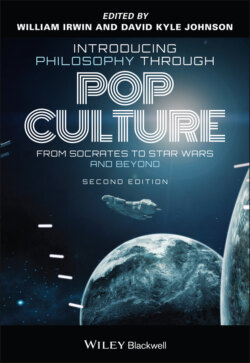Читать книгу Introducing Philosophy Through Pop Culture - Группа авторов - Страница 56
“You're Right. There's no Earth. It’s all a Legend”
ОглавлениеThere's a sharp distinction between “true belief” and knowledge. President Roslin illustrates this when she asks, “How many people know the Cylons look human?” Colonel Tigh responds, “The rumor mill's been working overtime. Half the ship's talking about it.” But Roslin retorts, “There'll always be rumors. For most people, that's all they'll ever be. I'm asking how many people actually know?” (“Water”). A belief based on an unverifiable rumor isn't knowledge, even if it happens to be true. Knowledge involves a belief in which one has reason for confidence.
A common view claims that knowledge is true belief accompanied by a convincing account justifying the belief. As Plato explains in the Theaetetus:
Now when a man gets a true judgment about something without an account, his soul is in a state of truth as regards that thing, but he does not know it; for someone who cannot give and take an account of a thing is ignorant about it. But when he has also got an account of it, he is capable of all this and is made perfect in knowledge.1
According to Plato, it's possible to attain truth without knowledge. Knowledge is more certain than mere true belief since the knower possesses a compelling justification for the belief's truthfulness. Someone holding a true belief based on a rumor or a lucky guess doesn't have knowledge because s/he doesn't have a reason for confidence in the belief.
The contemporary philosopher Edmund Gettier demonstrated the inadequacy of this view of knowledge by providing counterexamples in which a person's justification for a true belief turns out to be false.2 Say that Helo is walking down Galactica's corridors and sees his wife, Athena. Helo calls out to her, “Sharon!” because he has a compelling justification for believing that's her name. So he believes:
1 The woman in front of me is my wife, Athena.If Helo's justified in believing (a), knows his wife's name, and understands basic rules of reasoning, then he's also justified in believing:
2 The woman in front of me is named “Sharon.”
The truthfulness of (a) logically entails the truthfulness of (b).But let's suppose Helo's mistaken, for it's actually an identical robotic copy of Athena, Boomer who's in front of him – having infiltrated Galactica for some nefarious purpose. But Boomer is also named “Sharon.” Helo's belief (b) turns out to be true, but his justification for believing (b), belief (a), is false. Gettier claims that a counterexample like this shows a justified true belief that isn't knowledge since its justification is false. And this has become known as “the Gettier problem.”
Beliefs based on Adama's true lie about Earth are similar to Helo's true belief based on a false justification. Starbuck believes:
1 Adama knows the location of Earth.
This belief obviously implies:
1 Earth exists.
It's arguable that Adama's public testimony that he knows the location of Earth, as well as his private assurances to Starbuck in “Kobol's Last Gleaming, Part 1,” would be a proper justification for belief (c). It's reasonable to believe, as Adama claims, that he has access to privileged classified information as a “senior commander” in the Colonial fleet. Hence, Starbuck is justified in believing that Earth exists based on his testimony despite the fact that she doesn't realize that he is lying to her.
Even though Adama lies about knowing Earth's location and doesn't believe in its existence, it later becomes evident that Earth does exist. Starbuck discovers this for herself in the Tomb of Athena and after apparently journeying to Earth (“Home, Part 2”; “Crossroads, Part 2”). But Gettier would be quick to point out that, before these events, Starbuck holds a true belief (d) based on a false justification (c). Therefore, her true justified belief in Earth isn't really knowledge, until Adama's lie is no longer the primary justification for her belief.
